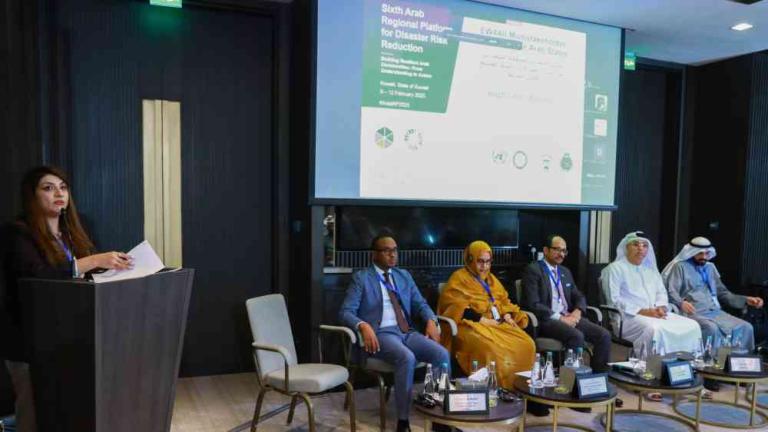The Sixth Arab Regional Platform for Disaster Risk Reduction in Kuwait City has concluded with a declaration which reaffirms the urgent need to strengthen resilience across the Arab region in the face of increasing disaster risks.
The four-day event brought together over 600 participants from governments, civil society, academia, the private sector, and international organizations under the theme, "Building Resilient Arab Communities: From Understanding to Action." It was hosted by the Government of Kuwait in collaboration with the United Nations Office for Disaster Risk Reduction (UNDRR) and the League of Arab States.
WMO led sessions on Science, Innovation, and Technology and Economic Benefits and Financing for Early Warning Systems.
The Arab States Regional Early Warnings for All (EW4All) Multi-Stakeholder Forum was held in conjunction with the regional platform on 9 February. It was co-led by WMO opened by WMO President Abdulla Al Mandous, and with a welcome address from WMO Secretary-General Celeste Saulo.
Celeste Saulo recalled that 2024 was the hottest year on record, and likely exceeded 1.5°C above the pre-industrial era.
" This has profound consequences for the Arab region , which is vulnerable to water scarcity, shifting rainfall patterns, flash floods, extreme heat and sand and dust storms. More extreme weather harms economic activity, labour and agricultural productivity, and human and environmental health," she said.
The latest report on the Global Status of Multi-Hazard Early Warning Systems (MHEWS) reveals significant regional disparities in coverage. Globally, only about half of all countries report having MHEWS, with 59% coverage in the Arab States.
Furthermore, the WMO Climate Services Dashboard highlights a critical gap: most Arab Member countries provide climate services at only a Basic or Essential level. Just 23% operate at Full or Advanced capacity.
WMO is therefore committed to strengthening early warnings and tailored climate information and services. This includes through the WMO Sand and Dust Storm Warning Advisory and Assessment System (SDS-WAS) , which monitors and forecasts dust storms, which increasingly affect health, infrastructure, and economic activities across the region.
"We need to scale up and strengthen existing systems through regional cooperation, knowledge-sharing, and technological innovation. Enhanced investments in climate-resilient infrastructure, impact-based forecasting, risk assessment tools and last-mile communication are vital to ensure that early warnings translate into early action. This will protect lives, livelihoods, and development gains," said Celeste Saulo.

Science, Innovation, and Technology
This session highlighted the role of artificial intelligence, machine learning, and the Internet of Things (IoT) in enhancing EWS forecasting, showcasing advanced solutions that ensure timely and accurate warnings.
Economic Benefits and Financing for Early Warning Systems
This session emphasized the cost-effectiveness of early warning investments and explored financial mechanisms to sustain disaster preparedness, including innovative funding approaches and donor engagement, reinforcing the importance of sustained investment in risk reduction.
Heatwaves
At a special event, WMO presented advancements in forecasting and early warning strategies, and guidance on heatwaves and health warnings services, including localized indicators for issuing warnings.
These include enhanced forecasting models that integrate real-time data, impact-based warnings tailored to health risks and vulnerable populations, and strengthened collaborative networks for data-sharing across agencies. It also emphasized the importance of public awareness campaigns in boosting preparedness efforts, ensuring communities are better equipped to respond to extreme heat events.
The Arab region is suffering from more extreme and prolonged heat episodes, with a major impact on health, labour productivity and economic activity.
Fragile and conflict-affected settings
International support is especially important for national meteorological and hydrological services operating under complex conditions.
WMO remains committed to enhancing partnerships and facilitating innovative solutions to ensure that even the most vulnerable communities have access to reliable early warnings, reinforcing the global drive towards inclusive and effective EWS.
Kuwait Declaration
The concluding declaration underscores the importance of accelerating the implementation of the Sendai Framework, enhancing governance for risk reduction, increasing investments in disaster-resilient infrastructure, and leveraging science, technology, artificial intelligence, and early warning systems.
It also emphasizes the need for
- comprehensive disaster loss databases and risk assessments to support evidence-based policymaking.
- greater regional cooperation, particularly in supporting countries affected by crises
- inclusive and sustainable approaches that engage governments, civil society, and the private sector in reducing disaster risks and protecting communities.






